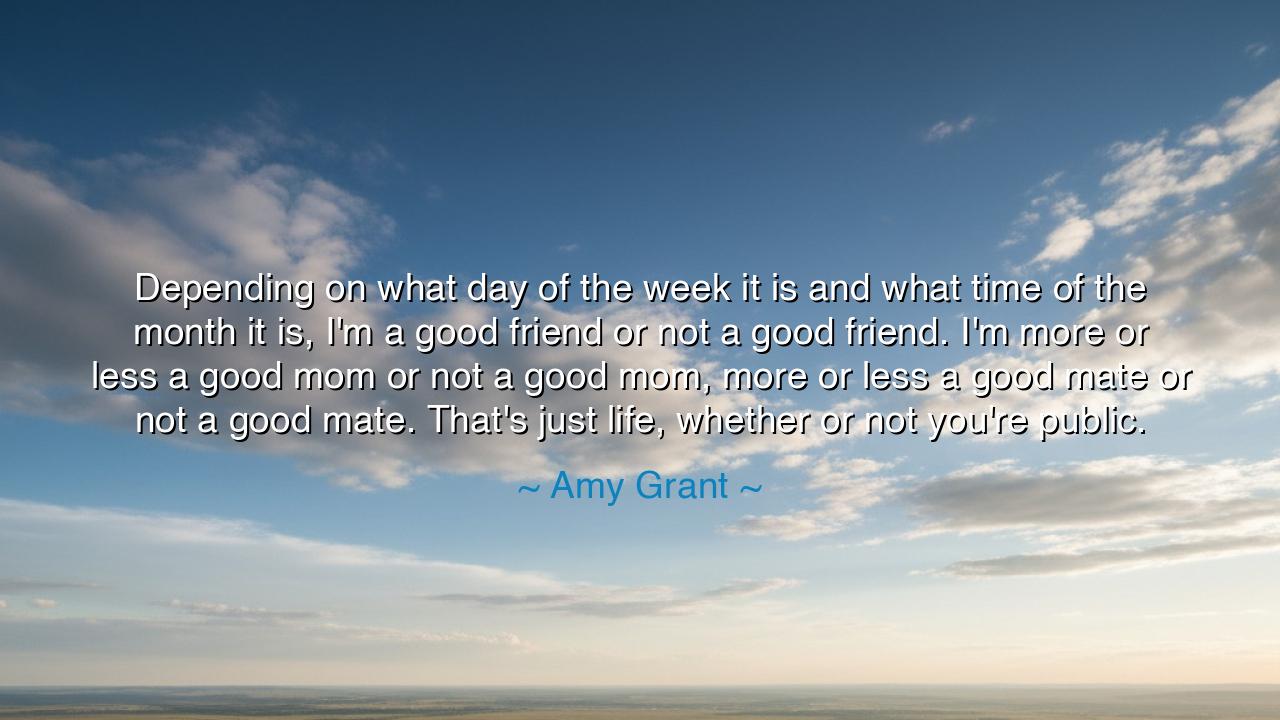
Depending on what day of the week it is and what time of the
Depending on what day of the week it is and what time of the month it is, I'm a good friend or not a good friend. I'm more or less a good mom or not a good mom, more or less a good mate or not a good mate. That's just life, whether or not you're public.






Hear, O children of wisdom, the humble yet profound confession of Amy Grant, who spoke thus: “Depending on what day of the week it is and what time of the month it is, I’m a good friend or not a good friend. I’m more or less a good mom or not a good mom, more or less a good mate or not a good mate. That’s just life, whether or not you’re public.” These words, though spoken simply, bear the fragrance of truth: that human beings are not constant in their perfection, but are ever-shifting, rising and falling like the tides.
First, let us see her honesty. She admits that sometimes she is a good friend, sometimes not; sometimes a good mom, sometimes not; sometimes a good mate, sometimes not. This is no false modesty, but the courageous acknowledgment of imperfection. For all who walk this earth know within themselves the same truth: we are never wholly what we wish to be. Some days our patience overflows, and some days it runs dry. To admit this aloud is not weakness, but strength, for it breaks the chains of pretense.
She speaks, too, of the cycles of time: day of the week, time of the month. In this she reveals a truth as ancient as the stars—that life is lived not in unbroken constancy, but in rhythms. Just as the moon waxes and wanes, just as the earth moves from harvest to winter, so too do the human heart and spirit rise and fall. The wise do not curse these changes, but learn to live with them, to understand that imperfection is part of the eternal order.
Consider the story of Marcus Aurelius, emperor of Rome and philosopher. In his Meditations, he often rebuked himself for failing to be patient, failing to be just, failing to live as he wished. Yet he did not despair. Instead, he reminded himself that to stumble is part of being human, and to rise again after stumbling is the essence of virtue. Amy Grant’s words echo his: greatness is not never failing, but continuing the journey even after failure.
She then reminds us: that’s just life, whether or not you’re public. This phrase carries deep wisdom. For some may think that fame or leadership demands constant perfection. Yet whether a person is hidden in quiet homes or shining on great stages, the truth remains: no one is perfect. To live is to be both faithful and failing, both strong and fragile. Fame does not erase humanity, nor does obscurity. All share the same struggles, and all are called to the same humility.
The meaning of her words is this: we must learn to forgive ourselves for being less than perfect. Too often, we measure ourselves against impossible ideals and despair when we fall short. But Grant reminds us that life itself is a rhythm of more and less, of trying and failing, of succeeding and stumbling. To accept this is not to give up, but to walk with honesty and grace.
So let the lesson be clear: strive always to be the best friend, the best parent, the best partner you can be. But when you falter, do not drown in shame. Rise again, apologize where needed, and begin anew. Speak gently to yourself, as you would to one you love, and remember that perfection is not the measure of worth—faithfulness is. Take practical steps: pause before harsh self-judgment, give thanks for small victories, and seek to grow a little each day. For in the end, the beauty of life lies not in being flawless, but in being fully human, and fully alive.






AAdministratorAdministrator
Welcome, honored guests. Please leave a comment, we will respond soon